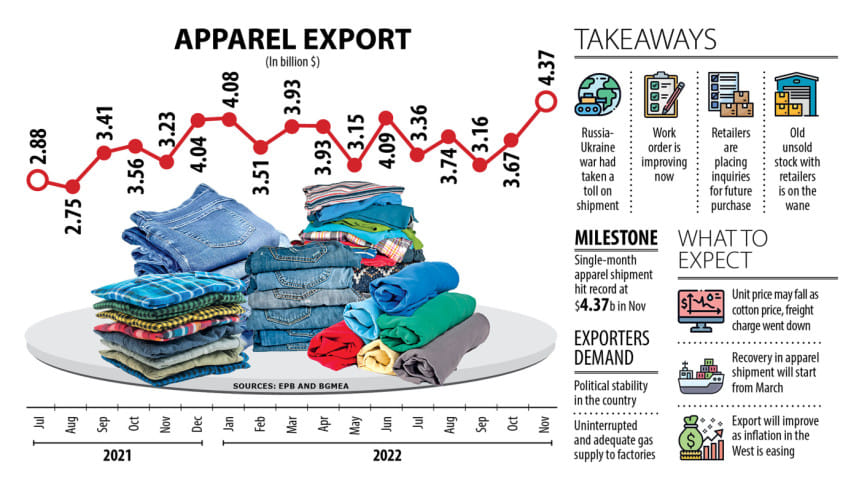Garment exporters see moderate recovery in 2023

Local apparel suppliers are expecting moderate recovery in exports in the upcoming year as sales in the Western world are gradually gaining pace with a new normal arising from the Russia-Ukraine war and falling prices of petroleum products.
This in turn is causing inflationary pressure in the Western world to subside gradually, effectively leaving more money in the pockets of the consumers, enabling them to start spending behind the purchase of clothing items.
One variant of the crude oil was selling at $79.56 per barrel in international markets yesterday whereas it had surpassed $123 at one point in the outgoing year because of the severe fallout of the war.
As a result, Christmas sales were also upbeat, with old stockpiles of clothing of international retailers and brands worth billions of US dollars being sold off.
This has prompted international clothing retailers and brands to start coming up with new work orders for factories and make inquiries for future purchases.
November retail sales dipped from a surge of early holiday shopping the month before but still saw solid year-over-year growth that marked a strong start to the holiday season, according to the US-based National Retail Federation (NRF).
The trade association contributes $3.9 trillion to the annual GDP of the US and supports one in four US jobs – 52 million working Americans.
"Consumers continued to spend on household priorities and holiday gifts for loved ones this November despite continued inflation and rising interest rates," NRF President and CEO Matthew Shay said in a statement last week.
"Holiday shoppers are demonstrating resilience, and retailers are providing great products and experiences at the right price levels to help stretch household budgets," he said.
"Consumers have been shifting back to in-store shopping for a more traditional holiday shopping experience, and we expect record participation for this year's Super Saturday shopping weekend," Shay said.
"While job and wage gains and built-up pandemic-era savings supported holiday shoppers in November, shoppers were squeezed by inflation and higher interest rates," NRF Chief Economist Jack Kleinhenz said in the statement.
"However, the recovery of the apparel shipment will not be strong, it would be moderate," said Md Fazlul Hoque, managing director of Narayanganj-based garment exporter Plummy Fashions.
"The real recovery is expected to start from March onwards," he said.
"We need not be worried as there will be moderate growth at the end of next year even in the difficult time of war," Hoque said.
If no war had taken place, there would have been a strong recovery, he said.
Also, uncertainty still prevails over when the war will come to an end and many issues have not been resolved yet, which may have an impact on global trade, said Hoque.
He also said earnings from garment shipments last month should not be taken into account as purchase trends have not been that strong at the buyers' end.
November's export earnings from garment shipment amounted to $4.37 billion, an all-time high for a single month.
Kutubuddin Ahmed, chairman of Envoy Textiles, a leading garment exporter, echoed Hoque regarding the recovery.
Because consumers entered a new normal as had been after the pandemic as no one knows when the war will come to an end, Ahmed told The Daily Star over the phone.
"People started adapting to a new normal as they are going through the severe impacts of war and inflation. Everybody is getting ready keeping in mind that this is wartime," Ahmed said.
He, however, said domestic issues such as political stability, uninterrupted gas and power supplies and low bank interest rates must be maintained to gain the global market share even in this tough time of war.
Adequate and timely gas supplies to industries is a must because the local suppliers may have to undertake expensive air shipments if they cannot supply goods on time because of a shortage of gas and power, he said.
If any exporter faces air shipment, s/he will very much end up losing out at this time of stiff competition, he added.
The year 2023 is a crucial year for local exporters as business in the Western world grew only by 4 per cent to 5 per cent year-on-year, said AK Azad, chairman and chief executive officer of Ha-Meem Group.
This is due to the fact that sales of old inventory increased but by not that much of an extent, he said.
Work orders for the next season between January and April are still some 15 per cent to 20 per cent less than what had been in the preceding season between September and December, he added.
Chances of a strong recovery are very thin and there will be a moderate recovery next year because of the war, said Faruque Hassan, president of the Bangladesh Garment Manufacturers and Exporters Association.
In such tough times, business operation costs should be reduced through smart operations of customs, bonds, ports and banking issues, he said.
The good news is that freight charges have declined significantly alongside cotton prices in international markets, which will also have a positive impact at the factory level, he said.
But at the same time, international retailers and brands will use it as an excuse to decrease the price per unit of clothing items, he added.

 For all latest news, follow The Daily Star's Google News channel.
For all latest news, follow The Daily Star's Google News channel. 



Comments